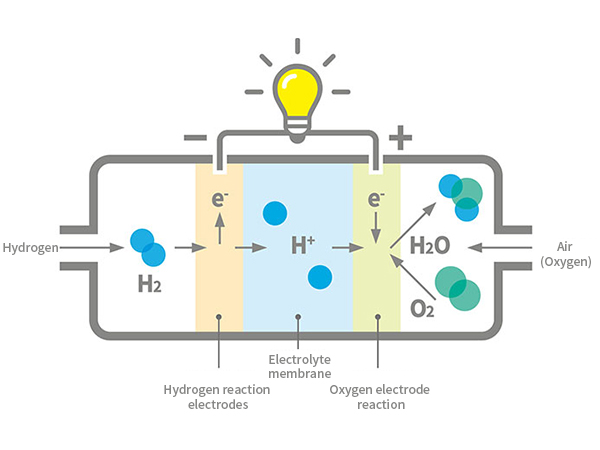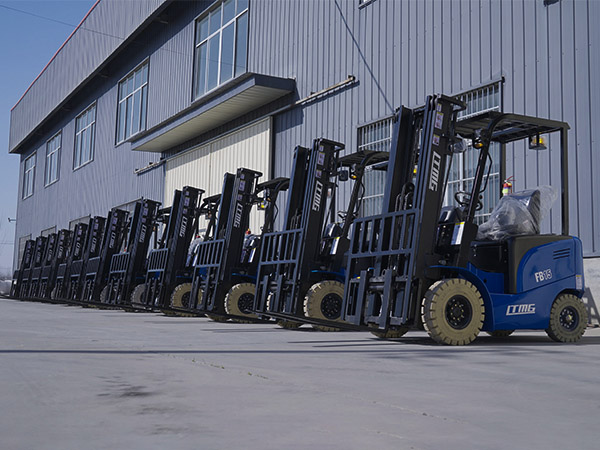With the increasingly serious environmental pollution and people's awareness of environmental protection, countries around the world have successively issued a series of policies and programs to promote sustainable development and accelerate energy transformation. Automobile exhaust emissions are an important part of environmental pollution. As a widely used industrial vehicle, forklifts have attracted more and more attention from governments and enterprises for their environmental protection. With the support of the "carbon peak" and "carbon neutral" policies, hydrogen fuel cell forklifts have begun to enter people's field of vision.
A hydrogen fuel cell is a power generation device that directly converts the chemical energy of hydrogen and oxygen into electrical energy. The basic principle is the reverse reaction of electrolyzed water. Hydrogen and oxygen are supplied to the anode and cathode respectively. After the hydrogen diffuses outward through the anode and reacts with the electrolyte, electrons are released to reach the cathode through an external load. Hydrogen fuel cell forklifts combine the advantages of pure battery forklifts and internal combustion engine forklifts. Not only can they be used in closed spaces without restriction, but they can also maintain high-performance operation for a long time. It is currently the only hydrogen fuel cell that has successfully achieved commercial operation in the world. power application.

So what are the advantages of hydrogen fuel cell forklifts?
(1) Environmentally friendly and sustainable
Taking one hydrogen forklift as an example, working 10 hours a day can reduce carbon emissions by about 30 kilograms, and 1,000 hydrogen forklifts can reduce carbon emissions by about 10,000 tons a year. Because the product is only water and does not produce any toxic chemical substances, it is also more friendly to the operating environment and operators.
(2) Low technical difficulty
Due to the non-enclosed application scenarios of forklifts, small operating range (small battery life requirements), and light weight of the vehicle body, compared with the application in the field of passenger vehicles and power generation, it has lower requirements for the corresponding fuel cell integration technology.
(3) High-intensity continuous operation
The hydrogen consumption of the fuel cell forklift is relatively slow and the hydrogenation is convenient. The hydrogenation time is only 14 minutes, and there is no need to replace the battery. Compared with the pure electric forklift, the battery life is longer, nearly 8 hours.
(4) Comparison of different forklifts
Since the hydrogen fuel cell forklift has the advantages of low comprehensive use cost, high-intensity continuous operation, and compliance with environmental protection policies, and avoids the shortcomings of internal combustion engine forklifts and pure electric forklifts, it is more suitable for long-term continuous operation and heavy workload. The working site, and can adapt to the working environment of minus 30 ℃ to 50 ℃. Compared with internal combustion engine forklifts and pure electric forklifts, hydrogen energy forklifts are more attractive to manufacturing industries that require a large number of multi-shift operations, large port terminals and logistics warehousing.

Since the forklift market is large enough and the operation scenarios are highly intensive, it is easy to solve the problem of hydrogen refueling and achieve mass promotion, which creates new opportunities for the development of fuel cells. In the future, the cost of fuel cell forklifts can not only compete with internal combustion engine forklifts in the whole life cycle, but also lower than internal combustion engine forklifts in procurement costs. Under the double-carbon target, hydrogen forklifts are expected to become the next "explosion point" of hydrogen power applications due to their large inventory and wide replacement space.
When will LTMG launch the first hydrogen fuel cell forklift? let us wait and see!
 Service Hotline:+86-17350015962/+86-0592-5681408
Service Hotline:+86-17350015962/+86-0592-5681408











